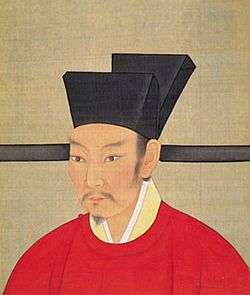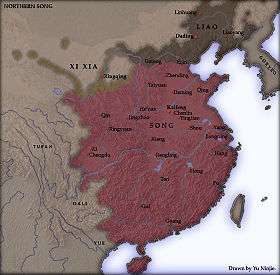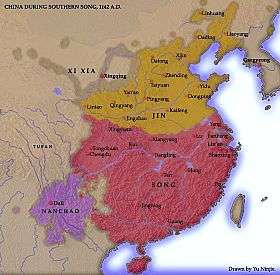Timeline of the Jin–Song Wars

The Jin–Song Wars were a series of armed conflicts conducted by the Jurchen Jin dynasty and the Song dynasty in the 12th and 13th centuries. The Jurchens were a Tungusic–speaking tribal confederation native to Manchuria. They overthrew the Khitan Liao dynasty in 1122 and declared the establishment of a new dynasty, the Jin.[1] Diplomatic relations between the Jin and Song deteriorated, and the Jurchens first declared war on the Song dynasty in November 1125.[2]
Two armies were dispatched against the Song. One army captured the provincial capital of Taiyuan, while the other besieged the Song capital of Kaifeng. The Jurchens withdrew when the Song promised to pay an annual indemnity.[3] As the Song dynasty weakened, the Jin armies conducted a second siege against Kaifeng. The city was captured and looted, and the Song dynasty emperor, Emperor Qinzong, was imprisoned and taken north to Manchuria as a hostage.[4] The remainder of the Song court retreated to southern China, beginning the Southern Song period of Chinese history.[1] Two puppet governments, first the Da Chu dynasty and later the state of Qi, were established by the Jin as buffer states between the Song and Manchuria.[5]
The Jurchens marched southward with the aim of conquering the Southern Song, but counteroffensives by Chinese generals like Yue Fei halted their advance.[6] A peace accord, the Treaty of Shaoxing, was negotiated and ratified in 1142, establishing the Huai River as the boundary between the two empires.[7] Peace between the Song and Jin was interrupted twice.[8] Wanyan Liang invaded the Southern Song in 1161,[9] while Song revanchists tried and failed to retake northern China in 1204.[10]
The Jin–Song Wars were notable for the appearance of new technological innovations. The siege of De'an in 1132 included the first recorded use of the fire lance, an early gunpowder weapon and an ancestor of the firearm.[11] The huopao, an incendiary bomb, was employed in a number of battles[12] and gunpowder bombs made of cast iron were used in a siege in 1221.[13] The Jurchens migrated south and settled in northern China, where they adopted the language and Confucian culture of the local inhabitants.[1] The Jin dynasty government grew into a centralized imperial bureaucracy structured in the same manner as previous dynasties of China.[14] Both the Song and Jin dynasties ended in the 13th century as the Mongol Empire expanded across Asia.[15]
See also
Notes
^a Omitted if the date of the event is unknown.
Citations
- 1 2 3 4 Holcombe 2011, p. 129.
- 1 2 3 Lorge 2005, p. 52.
- ↑ Lorge 2005, pp. 52–53.
- 1 2 3 4 Franke 1994, p. 229.
- ↑ Franke 1994, pp. 229–230.
- ↑ Mote 2003, p. 299.
- 1 2 Beckwith 2009, p. 175.
- ↑ Franke 1994, p. 239.
- 1 2 3 4 Franke 1994, p. 241.
- 1 2 3 4 Franke 1994, p. 248.
- 1 2 Chase 2003, p. 31.
- ↑ Partington 1960, pp. 263–264.
- 1 2 Lorge 2008, p. 41.
- ↑ Franke 1994, p. 235.
- 1 2 Lorge 2005, p. 73.
- 1 2 Mote 2003, p. 196.
- 1 2 3 4 Lorge 2005, p. 53.
- 1 2 Franke 1994, p. 230.
- ↑ Mote 2003, p. 301.
- 1 2 3 Franke 1994, p. 232.
- 1 2 3 4 5 Mote 2003, p. 303.
- 1 2 3 4 Franke 1994, p. 240.
- ↑ Franke 1994, p. 242.
- ↑ Partington 1960, p. 264.
- ↑ Franke 1994, p. 243.
- 1 2 Franke 1994, p. 247.
- 1 2 Franke 1994, p. 249.
- ↑ Franke 1994, p. 259.
- ↑ Franke 1994, p. 261.
References
- Beckwith, Christopher I. (2009). Empires of the Silk Road: A History of Central Eurasia from the Bronze Age to the Present. Princeton University Press. ISBN 978-0-691-13589-2.
- Chase, Kenneth Warren (2003). Firearms: A Global History to 1700. Cambridge University Press. ISBN 978-0-521-82274-9.
- Franke, Herbert (1994). Denis C. Twitchett; Herbert Franke; John King Fairbank, eds. The Cambridge History of China: Volume 6, Alien Regimes and Border States, 710–1368. Cambridge University Press. ISBN 978-0-521-24331-5.
- Holcombe, Charles (2011). A History of East Asia: From the Origins of Civilization to the Twenty-First Century. Cambridge University Press. ISBN 978-0-521-51595-5.
- Lorge, Peter (2005). War, Politics and Society in Early Modern China, 900–1795. Routledge. ISBN 978-0-203-96929-8.
- Lorge, Peter (2008). The Asian Military Revolution: From Gunpowder to the Bomb. Cambridge University Press. ISBN 978-0-521-84682-0.
- Mote, Frederick W. (2003). Imperial China: 900–1800. Harvard University Press. ISBN 978-0-674-01212-7.
- Partington, J. R. (1960). A History of Greek Fire and Gunpowder. Johns Hopkins University Press. ISBN 978-0-8018-5954-0.

